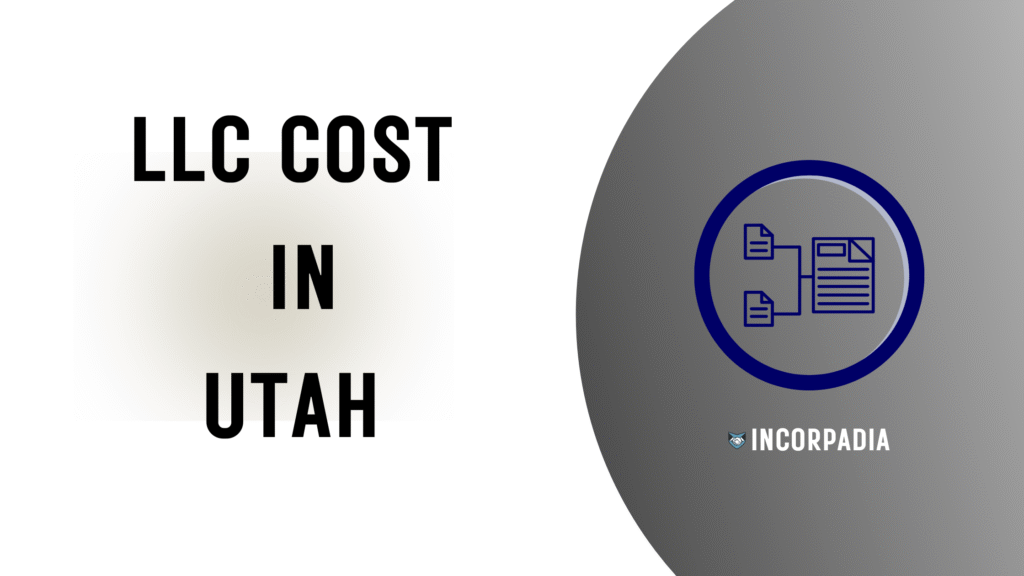Starting a business can feel like a daunting task, especially when it comes to understanding the legal structure. If you’re considering starting a business in Utah, one of the most popular and flexible business structures you can choose is a Limited Liability Company (LLC). An LLC offers a combination of personal liability protection and tax advantages, making it an excellent option for entrepreneurs.
In this guide, we’ll walk you through every step of the process of forming an LLC in Utah, as well as what to do after your LLC is established. By the end of this article, you’ll know exactly what you need to do to get your business up and running in Utah in 2025.
Costs Summary
| Cost Item | Amount (USD) |
|---|---|
| Filing Fee (Articles of Organization) | $70 |
| Registered Agent (Annual) | $50 – $300+ |
| Operating Agreement (Optional) | $0 – $100+ |
| Employer Identification Number (EIN) | $0 (if obtained from IRS) |
| Annual Renewal Fee | $20 |
Step 1: Search Your LLC Name
The first step in forming an LLC in Utah is choosing a name for your business. Your LLC’s name must meet specific guidelines in order to be accepted by the state.
Key Guidelines for Naming Your LLC
- Uniqueness: The name you choose must be unique and not already in use by another business entity in Utah. You can search for business names using the online business entity search tool provided by the Utah Division of Corporations.
- Include “LLC”: The name must contain the phrase “Limited Liability Company” or the abbreviation “LLC” or “L.L.C.” to clearly indicate the business structure.
- Prohibited Words: There are certain words that you cannot use in your LLC name unless you have special approval. For example, words like “bank,” “insurance,” and “university” are restricted because they imply a certain type of business. Make sure to avoid any words that may be misleading or confusing.
Tips for Choosing a Business Name
When choosing a name, it’s a good idea to consider the following:
- Branding: Pick a name that reflects the nature of your business and is easy to remember.
- Domain Name: Check if the domain name is available for your business. Having a matching website domain can help with branding and marketing.
- Trademark Search: Consider conducting a trademark search to make sure your business name is not infringing on another company’s trademark.
Once you’ve come up with a name, it’s important to check its availability. You can do this through the Utah Division of Corporations. If your name is available, you may want to reserve it for a period of time (up to 120 days), though this is optional.
Step 2: Choose a Registered Agent
A Registered Agent is an individual or business entity designated to receive important legal documents, government correspondence, and tax notices on behalf of your LLC. In Utah, the Registered Agent must meet the following criteria:
- Be a Utah Resident: The agent must have a physical street address in Utah. P.O. Boxes are not allowed.
- Be Available During Business Hours: Your Registered Agent must be available to receive documents during regular business hours.
Who Can Be a Registered Agent?
Your Registered Agent can be anyone who meets these requirements, including yourself. However, many LLC owners choose to hire a professional Registered Agent service. This can help maintain privacy, ensure you never miss important documents, and make it easier to run your business from out of state.
One popular option for a Registered Agent is Northwest Registered Agent, which offers great privacy protection and excellent customer service. They can handle all the required correspondence on your behalf, and many entrepreneurs find it worthwhile to pay a small annual fee to have their agent take care of these tasks.
Step 3: File a Certificate of Organization
The Certificate of Organization (sometimes called Articles of Organization) is the official document that establishes your LLC as a legal entity in Utah. You must file this document with the Utah Division of Corporations.
Here’s how you can file it:
How to File
- Online: The fastest and most convenient method is to file online through the Utah Division of Corporations website. You will need to create an account with UtahID, the state’s online business portal.
- By Mail: If you prefer to submit a paper application, you can download the Certificate of Organization form from the Utah Division of Corporations website. Complete the form and mail it to the following address: Utah Division of Corporations & Commercial Code
Box 146705
Salt Lake City, UT 84114-6705 - By Fax: If you prefer faxing the document, you can send it to the Division of Corporations at (801) 530-6438.
Filing Fees
Filing the Certificate of Organization costs $70. This is a one-time fee that is paid when you submit the document, regardless of the method you use.
Processing Time
Once your filing is received, the Utah Division of Corporations will process it within 7 to 10 business days. After approval, you’ll receive a confirmation that your LLC has been officially formed.
Step 4: Create an LLC Operating Agreement
Although it is not required by Utah law, an LLC Operating Agreement is a crucial document that sets out how your LLC will be run. It outlines the management structure, ownership, and decision-making process for your business. The Operating Agreement is an internal document, which means it’s not submitted to the state, but it is highly recommended for the protection of your business.
Key Elements of an Operating Agreement
- Ownership: Who owns the LLC, and what percentage of the business do they own? This is especially important if you have multiple members in your LLC.
- Management Structure: Who will manage the LLC? Will it be member-managed (run by the owners) or manager-managed (appointed managers run the LLC)?
- Profits and Losses: How will profits and losses be divided among the members? This section should clearly define how financial distributions will be made.
- Voting Rights: What voting powers do the members have, and how are major business decisions made?
- Transfer of Ownership: How can ownership be transferred or sold? This can help prevent disputes in the future if a member wants to sell their share.
An LLC Operating Agreement can be as simple or detailed as you like, but it’s an essential document that helps protect your business by clearly defining the rules for its operation.
Step 5: Obtain an EIN for Your LLC
An Employer Identification Number (EIN) is a unique number assigned to your business by the IRS. It’s similar to a social security number but for businesses. You will need an EIN to open a business bank account, hire employees, and file taxes.
How to Apply for an EIN
Fortunately, obtaining an EIN is a simple and free process. You can apply for one online through the IRS website. The online application process is straightforward, and you’ll receive your EIN immediately upon completion. You can also apply by mail or fax, but the online method is by far the fastest and most efficient.
If your LLC does not plan to have employees or file taxes as a corporation, you may not need an EIN. However, it’s highly recommended to obtain one for tax purposes and business dealings.
What to Do After Your LLC Is Approved
Once your LLC is officially formed in Utah, there are a few ongoing responsibilities you must be aware of to stay compliant with state laws.
File an Annual Report
All LLCs in Utah are required to file an Annual Report to maintain good standing with the state. The Annual Report is due by the last day of your LLC’s anniversary month, every year. The filing fee for the Annual Report is $20.
If you fail to file the Annual Report on time, you may face late fees, and your LLC may be administratively dissolved by the state.
LLC Taxes in Utah
Utah has a flat corporate income tax rate of 4.95%, and LLCs are considered pass-through entities for federal tax purposes. This means that the LLC itself doesn’t pay taxes. Instead, profits and losses are reported on the individual tax returns of the LLC members.
If your LLC has employees, you will also need to withhold and pay employment taxes. You’ll need to file federal, state, and possibly local payroll taxes, depending on where your business is located.
Utah Division of Corporations Contact Information
If you have any questions or need further assistance, the Utah Division of Corporations is available to help:
- Phone: (801) 530-4849
- Email: corporations@utah.gov
- Website: www.corporations.utah.gov
Conclusion
Starting an LLC in Utah in 2025 is a practical and efficient way to protect your personal assets while launching your business. The process is relatively simple, but requires attention to detail to ensure everything is done correctly and in compliance with state regulations. From choosing a unique and appropriate name for your business to filing the Certificate of Organization, each step plays a crucial role in establishing your LLC.
Choosing a Registered Agent and creating an Operating Agreement are key steps that protect your LLC and ensure smooth operations moving forward. These internal documents not only help in managing the business but also prevent potential disputes between members. Additionally, obtaining an EIN is essential for handling your taxes and opening a business bank account, making your LLC ready for growth.
Once your LLC is formed, it’s important to stay on top of your state’s ongoing requirements, such as filing an annual report and ensuring compliance with tax obligations. These annual filings, though simple, are necessary to maintain your LLC’s good standing and avoid penalties or dissolution.
Utah provides a favorable environment for LLCs, with a straightforward formation process and reasonable fees. Whether you’re an entrepreneur launching a new venture or transitioning from another business structure, Utah’s LLC laws provide the flexibility and protection you need to succeed.
By following the steps outlined in this guide, you can confidently navigate the process of starting an LLC in Utah. With your LLC officially formed, you’ll have a solid foundation to build your business, ensure its legal compliance, and take full advantage of the tax benefits that come with this business structure. Starting an LLC in Utah is a step towards securing your business’s future and creating a platform for long-term success.
FAQs
How much does it cost to form an LLC in Utah?
Forming an LLC in Utah costs $59 for the Certificate of Organization. There is also an annual report filing fee of $18 each year.
Do I need a Registered Agent in Utah?
Yes, every LLC in Utah must have a Registered Agent. This person or entity will receive official documents on behalf of your LLC.
How long does it take to get my LLC approved in Utah?
Once your Certificate of Organization is submitted, it typically takes 7 to 10 business days to process. Expedited services may be available for an additional fee.
Can I form an LLC without an Operating Agreement?
While Utah does not require an Operating Agreement, it is highly recommended. It provides clarity on how your LLC will be managed and helps protect your business in case of disputes.
Do I need an EIN?
If your LLC plans to hire employees, open a business bank account, or be taxed separately from its owners, you will need an EIN. This is a free and easy process available through the IRS.







